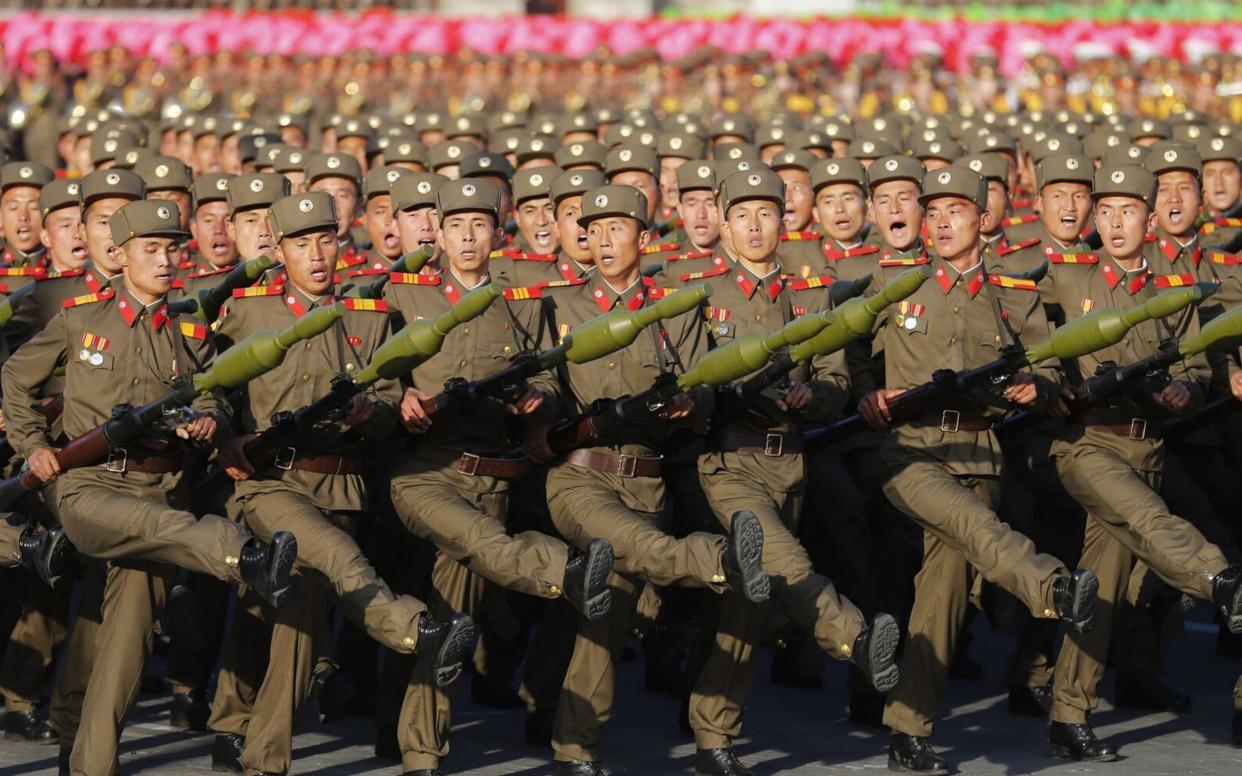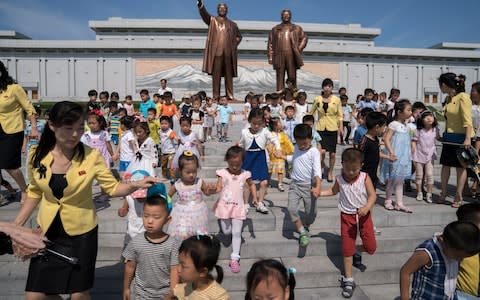North Korea has most modern-day slaves in the world, report reveals, as rights abuses laid bare

North Korea has the largest number of modern-day slaves in the world, with just over one in 10 of the population subjected to forced labour at the hands of the repressive state.
The shocking abuse, which includes young schoolchildren being coerced into exhausting manual work, is outlined on Thursday in the newly released 2018 Global Slavery Index, the largest survey in the world of human slavery and forced marriage.
Based on 71,000 individual interviews in 48 countries, the report by the Walk Free Foundation – a human rights group campaigning to end slavery – concludes that an estimated 40.3 million men, women and children are still being forced to work against their will.
About 2.6 million of them toil unseen behind the closed borders of the Hermit Kingdom. Such is the extent of their mistreatment that the Foundation dedicated a spin-off report specifically to shine a spotlight on their plight.
Of 50 defectors interviewed over the course of a year, all but one described servitude either as children or adults, or in some cases both.

Their accounts dated from 2011-2016, in a timely reminder of the grim reality of North Korean life under the current regime, despite leader Kim Jong-un’s sudden diplomatic charm offensive.
Child labour, through communal activities called “mobilisations”, is an integral part of North Korean society. Pupils, even of primary school age, are required to work for up to two months at a time in back-breaking farm work or manual labour like collecting discarded coal by railway tracks.
Schools, and not the children, receive payment for the work. Any students refusing to participate risks punishment or even expulsion.
“I constantly did farm work until the sixth year in elementary school. We did everything by hand, or with hand hoes and buckets,” testified one male defector.
“In the spring, we had to work for about one month in the summer, when we did weeding. We finished with our classes in the morning and then we spent the afternoon working,” he said. “In the autumn we worked longer, for about two months, as there was a lot of work associated with the harvest.”

The labour serves as a cheap way to prop up the controlling state. Another female defector described how, as a teenager, she had been enlisted to do construction on the Pyongyang highway for six months.
The servitude through “mobilisations” continues into adulthood, where citizens are coerced under the sinister threat of detention in a harsh labour camp.
The communal tasks could include a morning shift of road paving, or more sporadic projects including the construction of statues or reinforcing flooded river banks. Participants must bring their own tools.
But what is common to all tasks is the lack of choice. “You cannot refuse. If the work unit leader orders you to go to work, you have to do it. If you don’t, then your food rations are cut off,” revealed one interviewee.
Dr Jang Jin-sung, who defected in 2004 and who is now a Global Slavery Index panellist, told The Telegraph that citizens have been so indoctrinated, they do not even realise their enslavement.
Dr Jang, who rose to become the equivalent of poet laureate to Kim Jong-il, the current ruler’s father, did not escape enforced work even though he belonged to a societal elite.

“I didn’t know it when I was in the country, but looking back it was,” he said. “As a child I had to do farm work in the summer. I didn’t think of it as forced labour but as a righteous duty to the state.”
People were conditioned to see their obligations as moral and good, he explained. “This is just life, this is how life works. You just get on with it.”
Reform would require a shift in the current mentality that prioritises Kim Jong-un’s rights over anyone else’s, he argued. The international community had to recognise that Kim’s interests were not in the interests of his people.
The report also covers slavery within detention camps, and the travails of overseas workers deprived of fair wages.
Fiona David, the GSI’s Head of Research, said she had found the pervasive system of social control “deeply shocking.”
Social class still plays a determining role in your occupation. Citizens whose near ancestors were considered “subversive” are confined to “dirty, dangerous, degrading” jobs, she said. But even those in white collar professions like teaching could be required to work for no pay.
The research revealed that, perversely, some exploited workers are actually paying to have a job, to avoid detention.
“To avoid being sent to a labour camp you need to have a job number and to have a job number you have to pay for it. [This] means that you’re technically employed but it doesn’t mean that you get paid,” she explained.

In a case study that defies belief, a woman described how she was employed on paper in a piggery tasked with providing pork for the army. As there was no space to raise pigs or feed to give them, the labourers instead had to source 2kg of meat every month to hand over to managers.
The current talks between the US and its allies and Pyongyang should not turn a blind eye to North Koreans’ suffering, said Ms David. “We need to be going into discussions with North Korea with our eyes open ... we need to be mindful of the extremity of these human rights abuses.”
Michael Glendinning, director of Connect: North Korea, which helps refugees in the UK, said the international community should place conditions on development support to bring an end to forced labour.
Governments should closely monitor overseas North Korean workers, he added. “Legal action can and must be taken against employers hiring North Koreans overseas when the employers break the law.”

 Yahoo News
Yahoo News 
